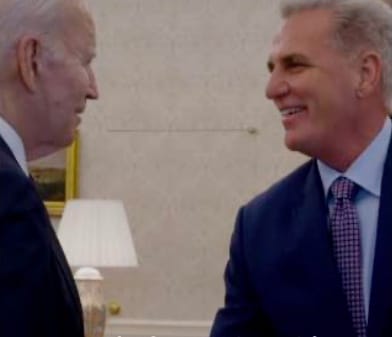President Biden and House Speaker Kevin McCarthy (R-CA) were set to meet again Monday to try to hammer out a deal to avoid defaulting on the nation’s debt.
The agreement came after Biden and McCarthy spoke by phone Sunday, after which the Speaker said, “My discussion with the President I think was productive.”
Despite noting that the two were “still apart” on the issue, McCarthy added, “I think we can solve some of these problems.”
That marked a change in tone from earlier this weekend, when the Speaker had said that “the White House moved backwards” on negotiations.
And before heading back to Washington from the G-7 summit in Japan Sunday—and before his phone call with McCarthy—Biden told reporters, “I’ve done my part,” pointing to trillions of dollars in proposed spending cuts and new sources of revenue.
“Now it’s time for the other side to move…from their extreme positions, because much of what they’ve already proposed is simply, quite frankly, unacceptable,” the President said.
Biden initially resisted negotiating on raising the debt limit, demanding a clean debt increase without any strings attached, but he has since agreed to budget talks alongside a debt increase.
Though the debt ceiling has been raised cleanly in years past, House Republicans have passed legislation that ties a short-term debt ceiling hike to decade-long spending cuts.
The bill, which passed in the House along partisan lines, includes cuts to veterans’ benefits and work requirements for Medicaid recipients.
To reporters while still in Japan Biden said that he would not agree to a deal that “protects, for example, a $30 billion tax break for the oil industry” or goes after Medicaid.
The federal government hit its $31.4 trillion debt limit on January 19, after which the U.S. Treasury undertook what Secretary Janet Yellen called temporary, “extraordinary measures” to prevent defaulting on the debt.
She has warned June 1 would be the day the government runs out of money, a date she reaffirmed over the weekend.
“There will be no acceptable outcomes if the debt ceiling isn’t raised, regardless of what decisions we make,” she said Sunday on NBC.
The United States has never defaulted on its debt. But it has repeatedly come close, perhaps most notably in 2011 when the U.S. suffered its only credit rating downgrade in its history, amid the rise of the conservative tea party movement in the House.


